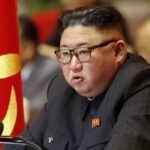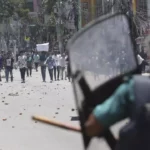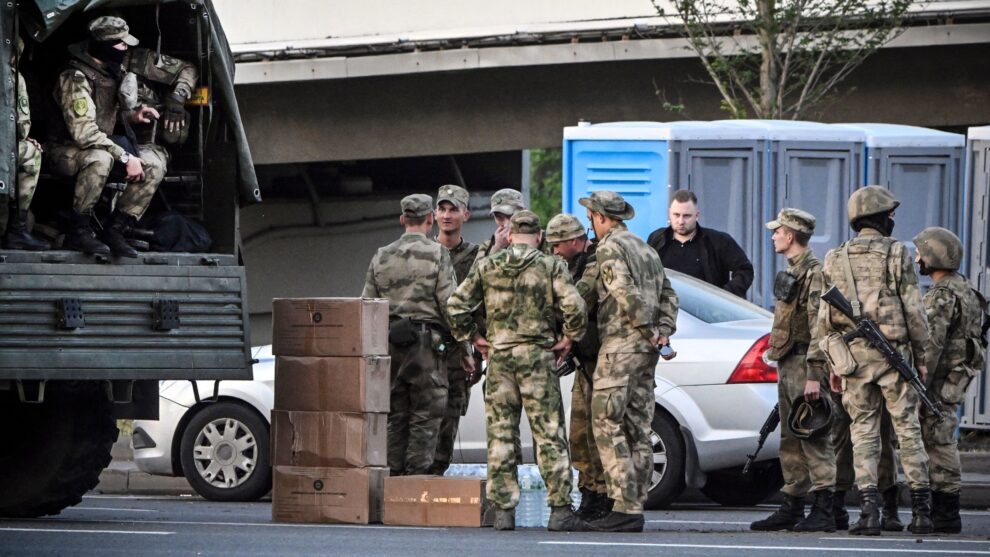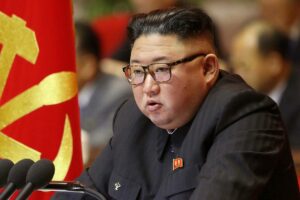Some leaders left to parse how to prevent challenges to their own power
This weekend, as members of the Wagner paramilitary group moved toward Moscow in an uprising against President Vladimir Putin’s authority, some of the most rapt observers of the unfolding tumult were the Asian countries who share cordial ties with Russia.
Wagner’s leader, Yevgeny Prigozhin, agreed to call off the mission saying he did not wish to spill blood, but only after his troops had mounted the boldest challenge to Putin during his decades in power. The events raise difficult questions about the ability of Putin’s regime to fulfill its stated objective of maintaining stability in a massive, unequal and nuclear-armed country.
In the fallout, Asian countries are attempting to identify the lapses that led to Prigozhin’s move and what the episode means for them — and, in the case of more authoritarian governments, how to prevent such challenges to the power of the state.
Open commentary about the mutiny by Asian countries has been cautious. China, Moscow’s “no limits” partner, released a brief response on Sunday describing the situation as “Russia’s internal affair.”
The statement, attributed to an unnamed foreign ministry spokesperson, went on to describe China as “Russia’s friendly neighbor and comprehensive strategic partner of coordination for the new era,” adding, “China supports Russia in maintaining national stability and achieving development and prosperity.”
China’s state news agency Xinhua downplayed the weekend’s events, writing that “the incident did not cause a major disorder in Russian society and people’s life in Moscow and beyond was barely affected.”
Since the start of Russia’s war on Ukraine last year, Beijing and Moscow have increasingly found themselves on one side of a growing global divide between a U.S.-led “rules-based international order” and a colder, more self-interested approach to foreign relations. Russian Deputy Foreign Minister Andrei Rudenko met in Beijing on Sunday with his Chinese counterpart, Qin Gang, though it was not clear when Rudenko had arrived in China or whether his visit was in any way related to the Wagner rebellion.
While unnerving, some analysts say the events in Russia are unlikely to spur lasting change of the global order. “The Wagner rebellion won’t change how leaders in Beijing and Pyongyang see their national interests as aligned with Russia and in competition with the United States and its allies,” Leif-Eric Easley, a professor at Ewha University in Seoul, told Nikkei Asia.
But China and other Asian countries have reason to wonder whether their cooperative relations with Russia would survive if Putin were to be forced out or otherwise replaced.
“If Russia was challenged by a coup, the autocratic states of Asia would be in trouble. They’ve been major supporters of Putin,” said Geoffrey Cain, senior fellow at the Foundation for American Innovation and author of “The Perfect Police State,” about China and the oppressiveness of surveillance technology, particularly in the Xinjiang region.
“China wants Russia to come under its sway,” Cain told Nikkei Asia. “But without Putin, the future would be uncertain, since the Kremlin is full of China-friendly and China-hostile factions.”
Iran also described the events in Russia as an “internal affair.” Foreign Minister Hossein Amirabdollahian spoke by telephone with his Russian counterpart and expressed support for “the rule of law in all countries, including the neighbor and friend, Russia, and criticized any foreign interference in the internal affairs of the countries.”
India is an old friend of Russia’s and relies on it for much of its defense equipment and as a source of inexpensive oil. This reliance means any instability in Russia is worrying for India, says Harsh V. Pant, a professor of international relations at King’s College London.
“The concern has always been that if Russia is so preoccupied with its own war [it could end up] unable to stick to its commitments in terms of supply of weapons,” Pant told Nikkei.
Myanmar’s military regime may have its own concerns about weapons supplies, as it relies on Russian aircraft and equipment in its brutal campaign to maintain its grip on the country. At the same time, Putin invited top general Min Aung Hlaing to visit Russia and has shielded the regime from sanctions at the United Nations Security Council.
Kim Jolliffe, an expert on Myanmar politics and conflict, said the military leadership is likely to draw lessons from Moscow’s experience. “The situation in Russia will be seen as evidence to Myanmar’s generals that their obsession with unity, hierarchy and discipline is fully justified,” Jolliffe said.
North Korea, a poor, autocratic country with a growing arsenal of nuclear weapons, also acknowledged the uprising in Russia. On Sunday, the North’s official news agency quoted the country’s vice foreign minister as expressing “strong support” for Russia’s handling of the situation.
The agency quoted the official as saying Pyongyang had “no doubt” the matter would be settled “in accordance with the will of the Russian people.”
An emerging consensus is that Putin made a grave error in invading Ukraine and that by seeking to project strength in his country’s environs, he made himself vulnerable at home. Despite a general climate of censorship in Russia, in recent months Prigozhin was given space to become an outspoken, even profane, critic of the Kremlin.
For North Korea and other autocratic Asian countries, the Wagner incident might provide a new impetus to tighten their own controls on dissent.
The system in North Korea is already constructed to minimize the possibility of a credible threat to the rule of leader Kim Jong Un. After taking power as a young political neophyte in 2011, Kim carried out purges across the upper ranks of North Korea’s government with the goal of eliminating potential challengers.
“Pyongyang employs various coup-proofing techniques, including personnel reshuffles, competing security institutions, resource restrictions, ideological campaigns and draconian surveillance,” Easley, the professor, said. “These aim to prevent the emergence of someone with Prigozhin’s influence over communications, funding and heavily armed units.”
Source: Nikkei















